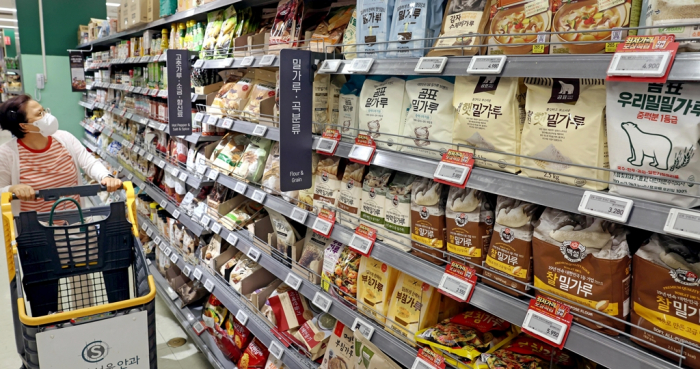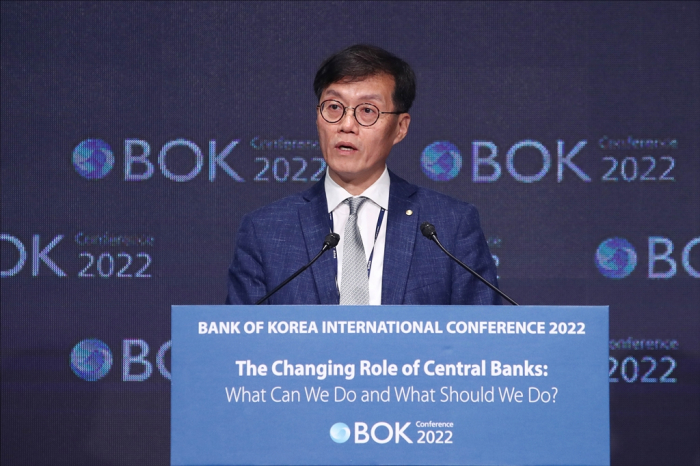Economy
Korea May inflation tops 5% for first time since 2008-09 crisis
BOK may raise interest rates in July as consumer prices up 5.4%, the fastest pace since August 2008
By Jun 03, 2022 (Gmt+09:00)
3
Min read
Most Read
Samsung shifts to emergency mode with 6-day work week for executives


CJ CheilJedang to sell feed, livestock unit for $1.4 bn


Affinity to buy SK Rent-a-Car at $572 mn, more deals expected


Keppel REIT to sell Seoul-based prime office T Tower


Samsung Electronics' key M&A man returns; big deals in the offing



South KoreaŌĆÖs inflation accelerated further in May to the fastest pace since the 2008-09 global financial crisis on surging energy and food prices, adding to expectations of further interest rate hikes.
Consumer prices in AsiaŌĆÖs fourth-largest economy rose 5.4% last month from a year earlier, the largest growth since August 2008, accelerating from 4.8% in April, government data showed on Friday. It was also the first time for inflation to exceed the 5% level since September 2008.
The Bank of Korea is expected to raise the base interest rate to 2.0% in July, marking an unprecedented tightening in a third straight meeting, analysts said. The central bank last month delivered a back-to-back hike for the first time in 15 years, indicating further increases as it raised its inflation forecast to the highest level in 14 years.
ŌĆ£A rate hike in July looks certain,ŌĆØ said Moon Hong-cheol, an economist at DB Financial Investment.
ŌĆ£The BOK is unlikely to immediately take a big step, but it is predicted to again mention the possibility of a big step later this year,ŌĆØ Moon said, referring to a larger-than-usual interest rate increase. Last month, BOK Governor Rhee Chang-yong said he will mull such aggressive tightening depending on data, although he later said the remarks reflected a theoretical stance.

TO STAY ABOVE 5% FOR IN JUNE AND JULY
Inflation is unlikely to cool down anytime soon on sustained supply disruptions of energy and food, as well as increasing domestic consumption with COVID-19 restrictions lifted, policymakers and analysts said.
ŌĆ£Inflation is expected to stay higher than the 5% level in June and July,ŌĆØ said Bank of Korea Senior Deputy Governor Lee Seung-heon said during a meeting to discuss measures against inflation.
Energy prices in May soared. Diesel prices jumped 45.8% on-year, the largest growth since December 2008, while prices of gasoline and kerosene surged 27% and 60.8%, respectively. That came even as the government expanded the tax cut on oil products to 30% from the previous 20% last month to ease the impact of soaring energy prices due to RussiaŌĆÖs invasion of Ukraine.
Processed food costs also advanced by 7.6% with prices of flour and cooking oil up 26% and 22.7%.
Finance Minister Choo Kyung-ho has repeatedly warned that inflation is likely to remain above 5% ŌĆ£for the time being.ŌĆØ
WAGES
Rising wages are also likely to add to inflationary pressure. The average household income totaled 4.8 million won per month in the first quarter, up 10.1% from a year earlier, the largest growth since 2006 when the country started compiling such data, according to the government.
Surging inflation increased demand for pay rises, especially at major companies. Samsung Electronics Co., the worldŌĆÖs top memory chipmaker, decided to raise wages by around 9% this year, while its smaller rival SK Hynix Inc. considered a hike of some 12%. Naver Corp. and Kakao Corp., local information technology giants, decided to increase budgets for wages by more than 10%.
Higher salaries could result in a vicious cycle since companies could raise product prices to reflect higher wages, intensifying inflationary pressure.
Choo on Thursday warned against such risks, asking the leaders of major lobby groups to take measures such as improving productivity for minimizing factors of higher prices.
Write to Byung-Uk Do and Mi-Hyun Jo at dodo@hankyung.com
Jongwoo Cheon edited this article.
More to Read
-
 EconomyKorea April inflation hits 13-1/2-year peak; bond yields up
EconomyKorea April inflation hits 13-1/2-year peak; bond yields upMay 03, 2022 (Gmt+09:00)
2 Min read -
 Central bankBOK steps up inflation fight with back-to-back rate hikes
Central bankBOK steps up inflation fight with back-to-back rate hikesMay 26, 2022 (Gmt+09:00)
2 Min read
Comment 0
LOG IN


